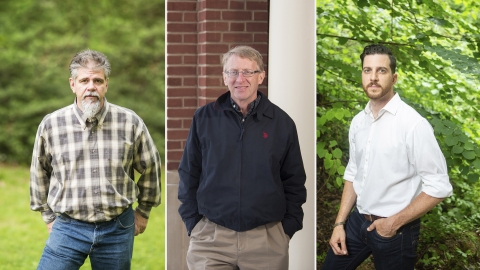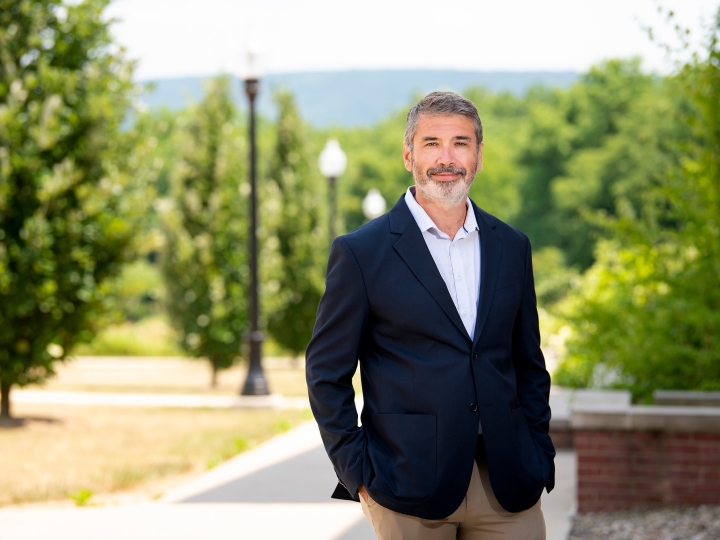
Some Good News: Environment Sees a Boost Before Earth Day’s 50th
April 17, 2020
Duane Griffin (left), Thomas Kinnaman (center) and Andrew Stuhl are Bucknell professors and environmental researchers. Photos by Brett Simpson; Emily Paine, Bucknell University; and Dustin Fenstermacher
It's been hard to find positives amid the current pandemic, but the environment may be one. The world has seen some marked environmental gains in terms of air quality due to reduced human activity, just in time for next Wednesday's 50th anniversary of Earth Day.
That's certainly some much needed good news, but is it sustainable? Some Bucknell professors and environmental researchers aren't sure.
"Yes, CO2 will go down during these months — a lot. But, as we learned from both 9/11 and from the 2008 Great Recession, CO2 will bounce right back up again with vigor," says economics professor Thomas Kinnaman, a leading environmental economist. "To get a sustained change, we must hope that this social distancing is somehow changing people permanently."
Professor Andrew Stuhl, environmental studies & sciences, anticipates that some psychological effects from the collective behavior now occurring will linger, and that people are learning what it takes for transformative change to happen on the societal scale.
"A few months ago, it would have seemed impossible for global society to pivot so quickly in terms of commerce, transportation, consumption and so on. And this seeming impossibility was often raised as a critique of any policy proposal for massive change to the American economy," says Stuhl, author of Unfreezing the Arctic: Science, Colonialism, and the Transformation of Inuit Lands. "Now people across the country can see how quickly the nation can shift."
That doesn't mean that environmental policy proposals will suddenly find more support. But Stuhl says it does mean the arguments against them will have to center on something more substantive than societal inertia.
Professor Duane Griffin, geography, agrees that the pandemic may have a profound effect on people's thinking regarding the environment and the political economy, but it’s too soon to know how and how much.
He notes that the timing of the pandemic-required shutdown is interesting. Not only is this Earth Day's golden anniversary, but 2020 marks the 30th anniversary of the Intergovernmental Panel on Climate Change's First Assessment Report, which focuses on another curve that needs flattening.
"The 30 years that could've been spent transitioning to more sustainable societies gradually and cheaply are gone," says Griffin, who is also an environmental studies & sciences faculty affiliate. "Greenhouse gas levels in the atmosphere have kept rising, and because of feedbacks and tipping points in the Earth system, this is the last decade we have to avoid a truly bad global outcome."
The temporary reduction in carbon emissions from the current lockdown won't change that. But money talks, and according to Kinnaman, most economists believe the way out of the climate crisis must include placing a very high price on carbon.
"This high price will incentivize energy conservation and the switch from fossil fuels to various renewables. We believe we can do this without disproportionately impacting low-income households if revenues from carbon pricing are used to provide relief in any number of ways," he says. "This strategy has been employed in various European countries and increasingly in Canada. Momentum around this strategy is growing internationally and across a broad spectrum of climate thinkers in and out of economics."
Stuhl sees the political and economic effects of the pandemic being the most consequential to the long-term health of the environment. Because of the economic hardship and unemployment caused by the crisis, he envisions a different economy emerging from the disaster, one shaped by the congressional stimulus packages.
"With these economic stimulus packages, Congress has a real chance for a down payment on a new, regenerative economy — one built on renewable and sustainable infrastructure, including across our agricultural, transportation and industrial sectors," he says.
But while cheaper renewable energy may emerge from the crisis, Kinnaman contends that still doesn't necessarily incentivize energy conservation.
"Tremendous reductions in carbon can be realized through old-fashioned steps to conserve energy and are relatively costless. But stimulus packages coming out of Washington are certainly going to promote the unsustainable energy consuming habits of most Americans, and this concerns me," he says. "The day that carbon is priced may be delayed by these current events."
The best case scenario, according to Griffin, is that the COVID-19 crisis will serve as a wake-up call and clean break in business-as-usual practices that may lead to governments and citizens re-evaluating practices that have the world headed toward a climate cliff.
"We're already seeing some things in the U.S. that may be pointing in that direction," he says. "Expertise is back in vogue, science is more important than celebrity, and collective action is working a miracle by slowing the virus’ spread."

